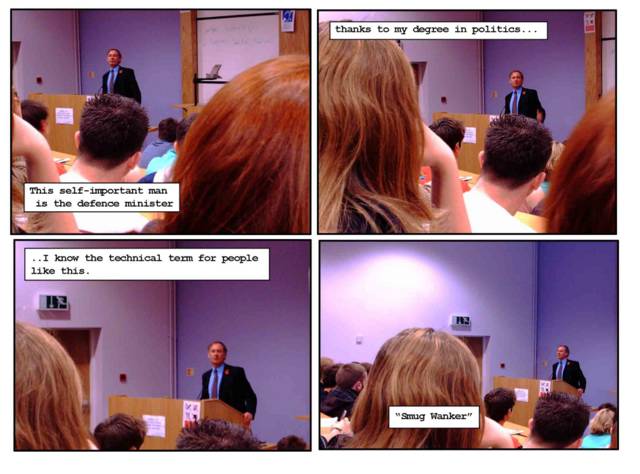Most people have heard about the ongoing conflict in
Darfur, even if they don't know much about it. For those of you who don't, the roots of the conflict lie in resentment felt by many Darfurians at the way the Sudanese government in Khartoum is neglecting them. This led to a rebellion by the Darfur Liberation Army (which later changed its name to the Sudan Liberation Army, SLA) and the
Justice and Equality Movement (JEM). In response the Sudanese government proceeded to arm and equip Janjaweed nomads, who come from a different ethnic group to most of the inhabitants in Darfur (the former are nominally Arabs, the latter Africans, although both are in fact black), who have carried out vicious attacks on Darfurian villages, forcing thousands to flee their homes, resulting in the deaths of anything between 100 and 200,000, perhaps even more. The conflict has been
described by many, including the
US Houses of Congress, as "genocide" and not without good reason.
The dynamics which led to the conflict, with the central government neglecting the populations of another part of the country is unfortunately mirrored elsewhere in Sudan. This lay at the root of the twenty-year war between Khartoum and the
Sudanese People's Liberation Movement/Army (SPLM/A) from the predominantly Christian south. It is also a problem in the east of the country. Not that you'd know it from the mainstream media who seem to have largely forgotten about the conflict in Darfur (despite
reports that Sudanese jets have been bombing villages in the region) let alone problems elsewhere in the troubled state.
I mention all this in order to introduce
this article which reports that Sudanese police killed between 20 and 40 people when they opened fire on demonstrators in the Red Sea city of Port Sudan in the northeast of the country.
As ever with issues in Sudan difficult questions arise as to how we respond. Activists have an instinctive opposition to western intervention, which is entirely understandable when one looks at the damage which such interventions have done over the years. That we should simply stand by while such violence is perpetrated by the Sudanese government, hardly seems a satisfactory response, however.
In many ways, that anti-imperialist movements must confront this conflict between our opposition to repression by governments and western imperialism is a sign of their weakness. If they were more powerful, the debate would be more important (because it would have real consequences), but other options might be available. It is possible to conceive of a response along the lines of the efforts of
Peace Brigades International (PBI) or the
International Solidarity Movement (ISM), albeit on a considerably larger scale. The
participation of many socialists and anarchists in the
Spanish Civil War as a demonstration of their opposition to Fascism, perhaps provides a further model.
In the meantime we must compromise within the realities of the world we live in if we wish to avoid condemning ourselves to irrelevance. In the context of Darfur, it is my opinion that an African Union peacekeeping force (perhaps funded by much richer western governments) should be empowered to intervene forcefully to protect Darfurians. This should be coupled with efforts to address the grievances which fuel the conflict and incorporate not just the armed actors (the government and the rebels), but also representatives of civil society.
Is this a realistic response in the northeast? Certainly the AU does not have enough resources to police all of Sudan (Darfur alone is the size of France). Perhaps as the conflict is at a much earlier stage there is much more potential for effective intervention on the part of western activists. The efforts of PBI in the likes of Colombia, Aceh and Mexico demonstrate that this sort of activity is possible and can have a positive effect.
To be sure, such a response is unlikely to be forthcoming, but the question then is why not? Why do we allow situations such as this to develop until our government decide that the time is ripe for "humanitarian intervention," only to find ourselves forced to chose between the devil and the deep blue sea? It is time we became more proactive and started building the kind of world we'd like to see rather than just responding to the excesses of our glorious leaders. There's a world to win. What are you waiting for?



